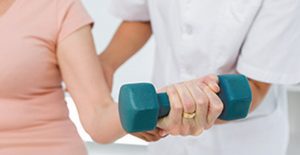By Colin E. Champ, MD, CSCS – Radiation Oncologist
 Although it may seem counterintuitive, evidence shows that exercise can increase energy levels, and immune function.
Although it may seem counterintuitive, evidence shows that exercise can increase energy levels, and immune function.
In 2019, an expert panel organized by the American College of Sports Medicine (ACSM) put forth new updated guidelines on exercise and cancer based on the panel’s thorough review of the scientific evidence on physical activity and cancer.
Over the past 10 years, there have been numerous studies on the benefit of exercise for cancer patients. From these findings, we know that individuals living with cancer and those that have gone through treatment, can benefit from physical activity and while they may not feel like exercising, when they start, it will give them more energy and stamina.
Dr. Kathryn Schmitz, who co-chaired the ACSM panel said the following, “We are at a point in the evolution of the field where we can dose exercise precisely, just as we do with drugs, to address several cancer-related health outcomes.”
“The ACSM panel found evidence that providing specific exercise prescriptions for a number of cancer-related health outcomes benefitted people living with or beyond cancer.” Dr. Schmitz continued, “As an example, we saw strong evidence that an exercise program consisting of a half hour of aerobic exercise three times weekly was sufficient to improve anxiety, depression, fatigue, quality of life, and physical function in cancer survivors.
“There was also evidence of a benefit for most of those same outcomes from twice-weekly resistance exercise. However, anxiety and depression do not appear to be improved by resistance training alone, but they do improve with resistance training in combination with aerobic training. In addition, the panel concluded that there is no increased risk of lymphedema from twice-weekly resistance training.
“The current evidence is still insufficient as to whether exercise can improve other health outcomes, such as peripheral neuropathy, cardiotoxicity, cognitive functioning, pain, or chemotherapy completion rate.”
Exercise for Cancer Survivors
Many cancer survivors live fairly sedentary lives. For survivors that are reluctant to jump into a full exercise program, even minimally amounts of exercise can benefit patient’s overall health and energy levels. Patients should always start out slowly and build up their physical activity over time. When patients begin an exercise routine, their fitness levels, endurance and strength typically increase. Exercise may help to reduce recurrence in cancer.
Studies on Specific Cancer and Exercise therapy
Breast Cancer
Fourteen studies have revealed that exercise significantly improves quality of life in breast cancer patients.1 It also significantly improved physical functioning of women with breast cancer and improves their peak oxygen consumption, while reducing their fatigue.
Women who engage in both aerobic and resistance exercise – again that mix of activities – with weights soon after their breast cancer treatment experience large health-related improvements.2 They also experience these improvements much faster than those women who wait to start exercising.
Cancer and Exercise
Studies have already shown exercise to be as useful as medications for the prevention of coronary heart disease and diabetes and better than medications for patients who have experienced a stroke.3 If exercise, a free treatment without side effects, can do the same for cancer patients, isn’t it time to give it a go?
Cancer treatment is no walk in the park. It is clearly a physically and emotionally taxing time for men and women alike. However, whether it is during treatment or after, maybe we should take more walks in the park — and vigorous ones at that.
Inspire Exercise Medicine
Inspire Exercise Medicine is focused exclusively on supporting cancer patients on the road to regaining their health with oncologist defined evidence-based treatment plans for nutrition and exercise in support of their overall health and wellness.
A significant part of the Inspire Exercise Medicine space is dedicated to physical, monitored exercises on machines and with exercise equipment, specifically selected for treatment purposes.
INSPIRE MEDICINE
239.429.0800
InspireExerciseMedicine.com
3555 Kraft Road, Suite 130, Naples, FL 34105
Dr. Colin Champ, MD, CSCS
Dr. Colin Champ, MD, is a radiation oncologist with board certifications in radiation oncology and integrative and holistic medicine. Dr. Champ’s research interests include the prevention and treatment of cancer with lifestyle modification, including exercise and dietary modification
References:
1. McNeely ML, Campbell KL, Rowe BH, Klassen TP, Mackey JR,
Courneya KS. Effects of exercise on breast cancer patients and
survivors: a systematic review and meta-analysis. CMAJ.
2006;175(1):34-41. doi:10.1503/cmaj.051073.
2. Milne HM, Wallman KE, Gordon S, Courneya KS. Effects of a
combined aerobic and resistance exercise program in breast cancer
survivors: a randomized controlled trial. Breast Cancer Res Treat.
2008;108(2):279-288. doi:10.1007/s10549-007-9602-z.
3. Monga U, Garber SL, Thornby J, et al. Exercise prevents fatigue and
improves quality of life in prostate cancer patients undergoing
radiotherapy. Arch Phys Med Rehabil. 2007;88(11):1416-1422.
doi:10.1016/j.apmr.2007.08.110.









